Image courtesy of the Recording Academy
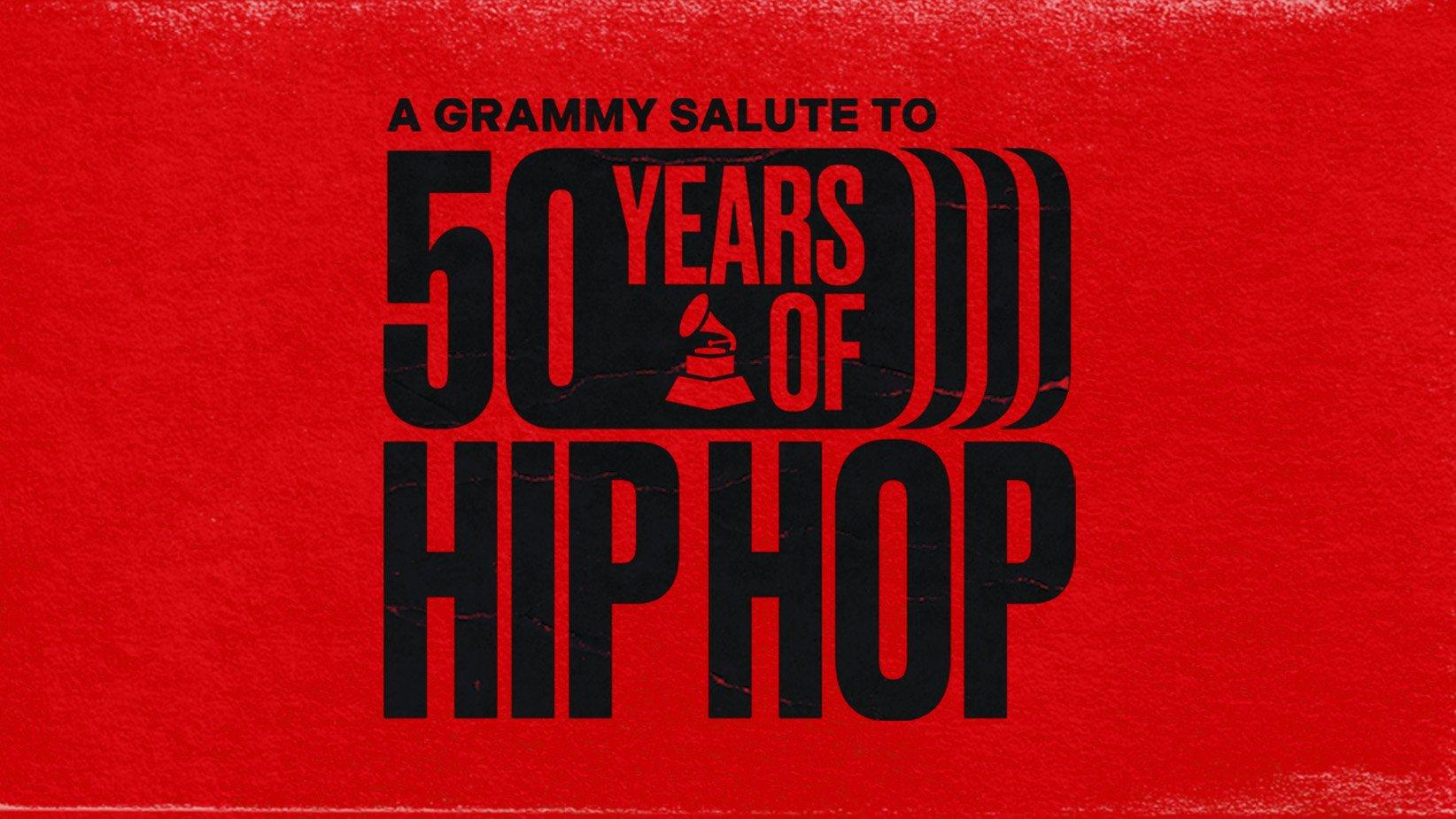
news
Additional Performers Added To "A GRAMMY Salute to 50 Years of Hip-Hop" Live Concert Special: 2 Chainz, T.I., Gunna, Too $hort, Latto, E-40, Big Daddy Kane, GloRilla, Three 6 Mafia & More Confirmed
The star-studded tribute will take place Wednesday, Nov. 8, at YouTube Theater at Hollywood Park in Inglewood, California. Tickets are on sale now. "A GRAMMY Salute to 50 Years of Hip-Hop" will air on Sunday, Dec. 10, on CBS and Paramount+.
This article was updated Sunday, Dec. 10, to add the full performer lineup.
The massive lineup for the "A GRAMMY Salute to 50 Years of Hip-Hop" live concert special just got bigger and more legendary with the addition of rap icons and next-gen hip-hop superstars: 2 Chainz, T.I., Gunna, Too $hort, Latto, E-40, Big Daddy Kane, GloRilla, Juvenile, Three 6 Mafia, Cypress Hill, Jeezy, DJ Quik, MC Lyte, Roxanne Shanté, Warren G, YG, Digable Planets, Arrested Development, Spinderella, Black Sheep, and Luniz have all been added to the lineup.
They join previously announced performers Black Thought, Bun B, Common, De La Soul, Jermaine Dupri, J.J. Fad, Talib Kweli, The Lady Of Rage, LL COOL J, MC Sha-Rock, Monie Love, The Pharcyde, Queen Latifah, Questlove, Rakim, Remy Ma, Uncle Luke, and Yo-Yo, who will perform at a once-in-a-lifetime live concert special celebrating the 50th anniversary of hip-hop, which the Recording Academy is honoring all year long across 2023. See the full performer lineup.
Airing Sunday, Dec. 10, at 8:30 p.m. ET/8 p.m. PT on the CBS Television Network and streaming live and on demand on Paramount+, "A GRAMMY Salute to 50 Years of Hip-Hop" is a two-hour live concert special that will showcase the profound history of hip-hop and celebrate the genre's monumental cultural impact around the world. The special will feature exclusive performances from hip-hop legends and GRAMMY-winning artists and much more.
The live concert comprising the "A GRAMMY Salute To 50 Years Of Hip-Hop" special, which is open to the public, will take place on Wednesday, Nov. 8, at YouTube Theater at Hollywood Park in Inglewood, California. Footage from the concert will then air on Sunday, Dec. 10, as a live concert TV special.
Explore More Of "A GRAMMY Salute to 50 Years of Hip-Hop"
6 Highlights From "A GRAMMY Salute To 50 Years Of Hip-Hop": Performances From DJ Jazzy Jeff & The Fresh Prince, Queen Latifah, Common & More
Here’s All The Performers And Songs Featured At "A GRAMMY Salute To 50 Years Of Hip-Hop"
Watch Backstage Interviews From "A GRAMMY Salute To 50 Years Of Hip-Hop" Featuring LL Cool J, Questlove, Warren G & E-40, And Many More
How DJ Jazzy Jeff & The Fresh Prince Created The Ultimate Prototype For The Producer/Rapper Duo
For Questlove, "A GRAMMY Salute To 50 Years Of Hip-Hop" Is Crucial For Rap's Legacy
How Lin-Manuel Miranda Bridged The Worlds Of Broadway & Hip-Hop
How To Watch "A GRAMMY Salute To 50 Years Of Hip-Hop": Air Date, Performers Lineup, Streaming Channel & More
Full Performer Lineup For "A GRAMMY Salute To 50 Years Of Hip-Hop" Announced: Roddy Ricch, Chance The Rapper, Nelly, Coi LeRay, Akon, Mustard & More Artists Added
DJ Jazzy Jeff And The Fresh Prince To Reunite Onstage At "A GRAMMY Salute To 50 Years Of Hip-Hop"

"A GRAMMY Salute To 50 Years Of Hip-Hop" Airs Sunday, Dec. 10: Save The Date
Full concert details are below:
Concert:
Wednesday, Nov. 8, 2023 (tonight)
Doors: 6 p.m. PT
Concert: 7 p.m. PT
Venue:
YouTube Theater
1011 Stadium Dr.
Inglewood, CA 90305
Full List Of Confirmed Performers For "A GRAMMY Salute To 50 Years Of Hip-Hop":
Battlecat
Black Sheep
Blaqbonez
DJ Diamond Kuts
DJ Greg Street
DJ Jazzy Jeff and the Fresh Prince
DJ Trauma
^Names in bold indicate newly added artists.
Stay tuned to GRAMMY.com for more news and updates about "A GRAMMY Salute to 50 Years of Hip-Hop."
A GRAMMY Salute to 50 Years of Hip-Hop is produced by Jesse Collins Entertainment. Jesse Collins, Shawn Gee, Dionne Harmon, Claudine Joseph, LL COOL J, Fatima Robinson, Jeannae Rouzan-Clay, and Ahmir "Questlove" Thompson for Two One Five Entertainment serve as executive producers and Marcelo Gama as director of the special.
Hip-Hop Just Rang In 50 Years As A Genre. What Will Its Next 50 Years Look Like?
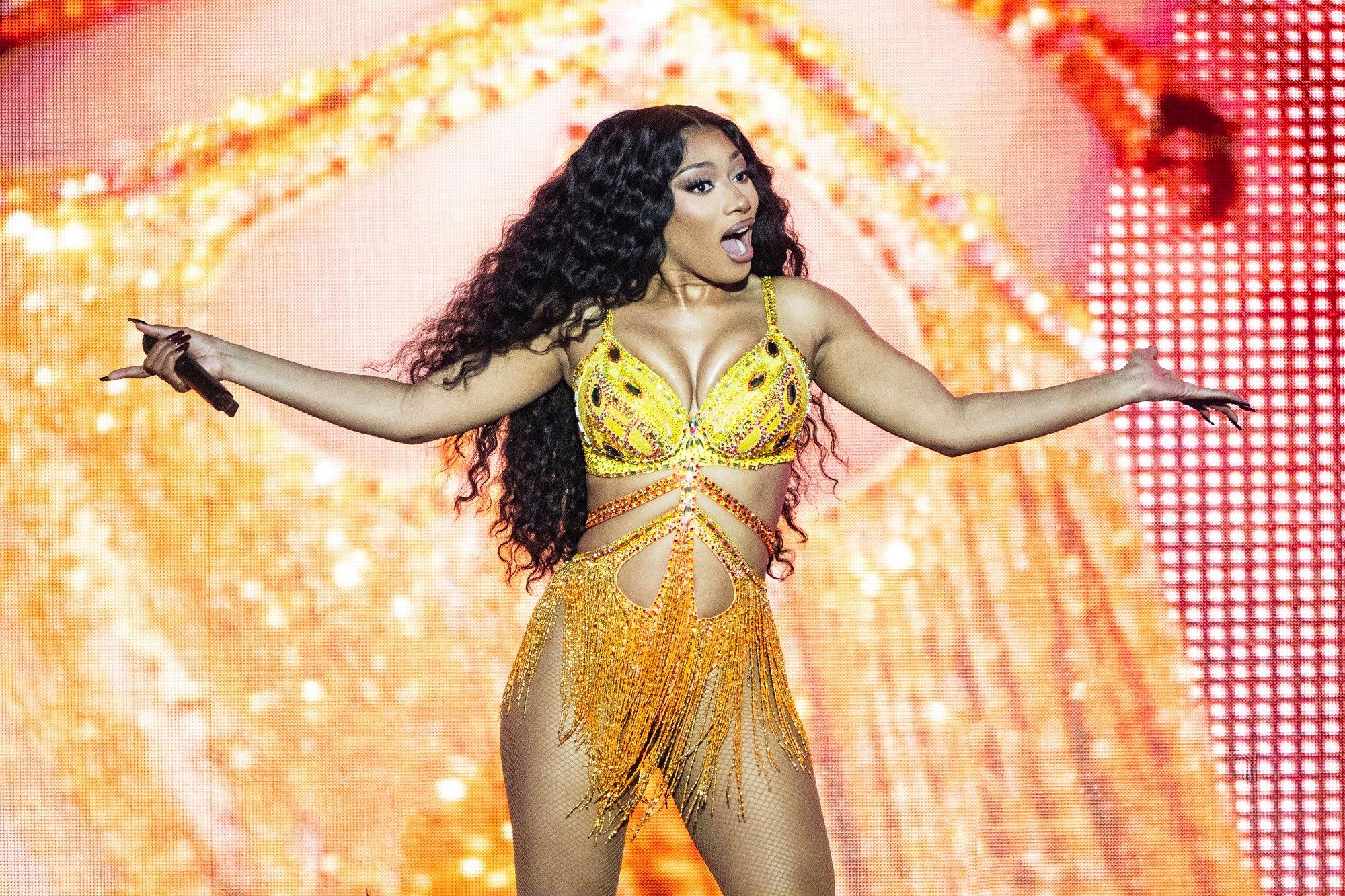
Photo: Erika Goldring/Getty Images
list
6 Takeaways From Megan Thee Stallion's 'Megan': Snakes, Shots & Self-Assurance
From the serpentine theme to Japanese rhyme schemes, Megan Thee Stallion's third album snatches back her own narrative and isn't afraid to take a bite.
Beware of venom: Megan Thee Stallion is not biting her tongue on her new album, simply titled Megan.
The GRAMMY winner's first full-length release in two years is also the first to drop under her own control. Fans have been ready for this release even before the first single, "Cobra," came out in November. The second single, "Hiss," followed in January and brought the star her first No. 1 hit on the Billboard’s Hot 100 and Global 200 charts. These songs, as well as the third single, "BOA," foreshadowed a certain slithery theme that helped shape the album.
Megan was released on June 28 and features guest stars such as GloRilla, Victoria Monét, Big K.R.I.T. and Kyle Richh as well as her longtime ace producers like Juicy J (who made "Hot Girl Summer" among other calling cards) and LilJuMadeDaBeat, who produced Stallion anthems like "Big Ole Freak," "Body" and "Thot S—."
Here’s what we learned from listening and vibing to the latest work by three-time GRAMMY winner Megan Thee Stallion.
A Theme Snakes Through Megan
As could have easily been predicted from the first three singles "Cobra," "Hiss" and "BOA," and now the album track "Rattle," there is a hint of a snake theme that wends its way through the album from beginning ("Hiss") to end ("Cobra").
In several songs, she denounces all the snake behavior that she has encountered from former lovers, friends, and haters who support those who have caused actual harm to her. In the music video for "Cobra," Megan literally sheds her old skin to reveal a shining new layer.
Megan Is Calling The Shots This Time
"I feel like Biggie, 'Who Shot Ya?’/But everybody know who shot me, bitch/ So now, let’s stop speaking on the topic," she rapped in "Who Me (feat. Pooh Shiesty)" off her 2022 album Traumazine. MTS was referencing the July 2020 incident in which rapper Tory Lanez shot her in the foot, and was subsequently charged with assault with a semiautomatic firearm and carrying a loaded, unregistered firearm in a vehicle.
Turns out, she wasn’t done referencing the topic. Now, she’s one taking the shots. MTS takes aim at less-talented women rappers on "Figueroa" (named for a Los Angeles street known for prostitution), and at Lanez on "Rattle," when she suggests that his male supporters should schedule a conjugal visit with him in prison. (Lanez is currently serving a 10-year sentence while simultaneously going through a divorce with wife Raina Chassagne.)
More Megan Thee Stallion News & Videos
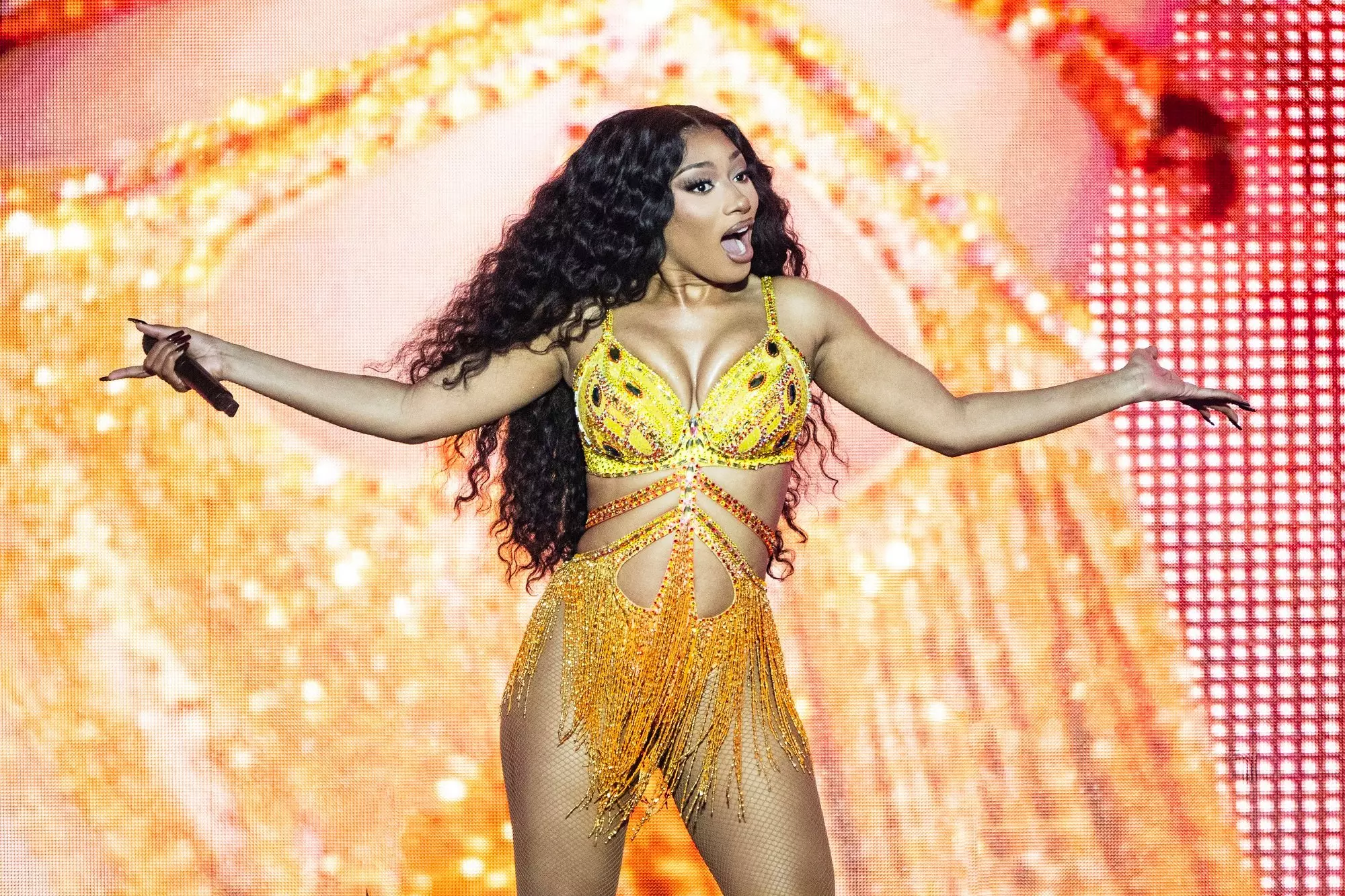
6 Takeaways From Megan Thee Stallion's 'Megan': Snakes, Shots & Self-Assurance
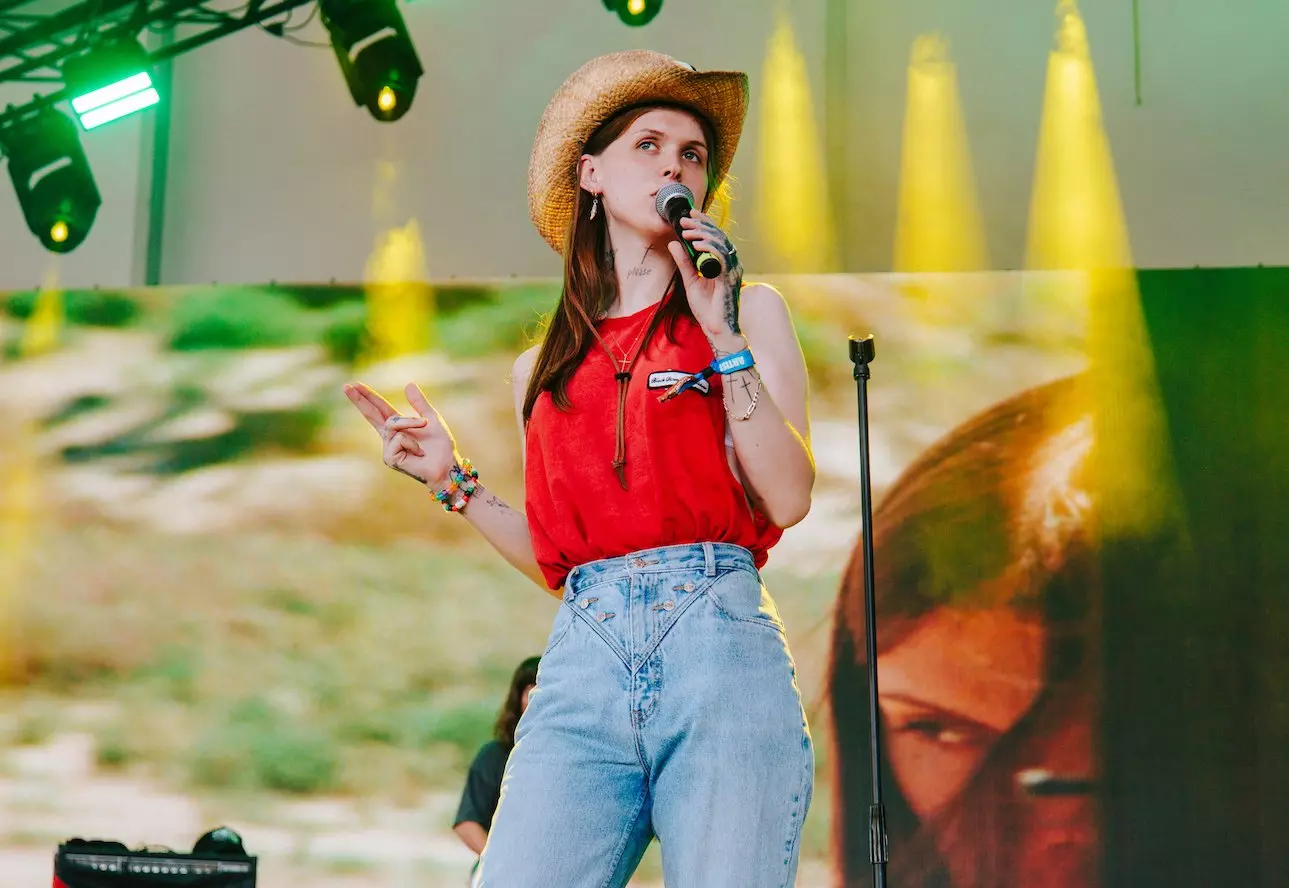
9 Epic Sets From Bonnaroo 2024: Ethel Cain, Melanie Martinez, Megan Thee Stallion & More
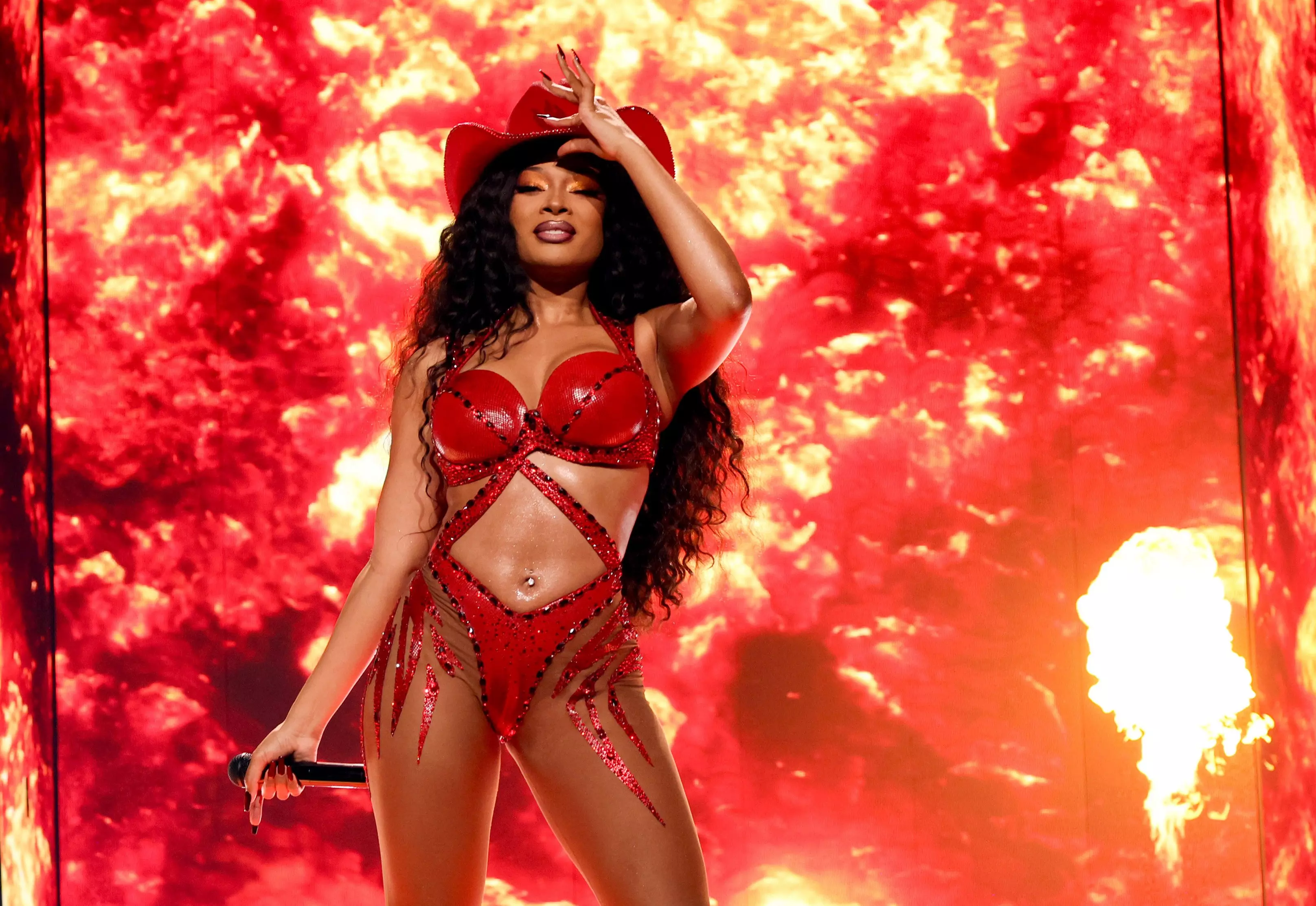
5 Iconic Moments From Megan Thee Stallion's Houston Hometown Shows
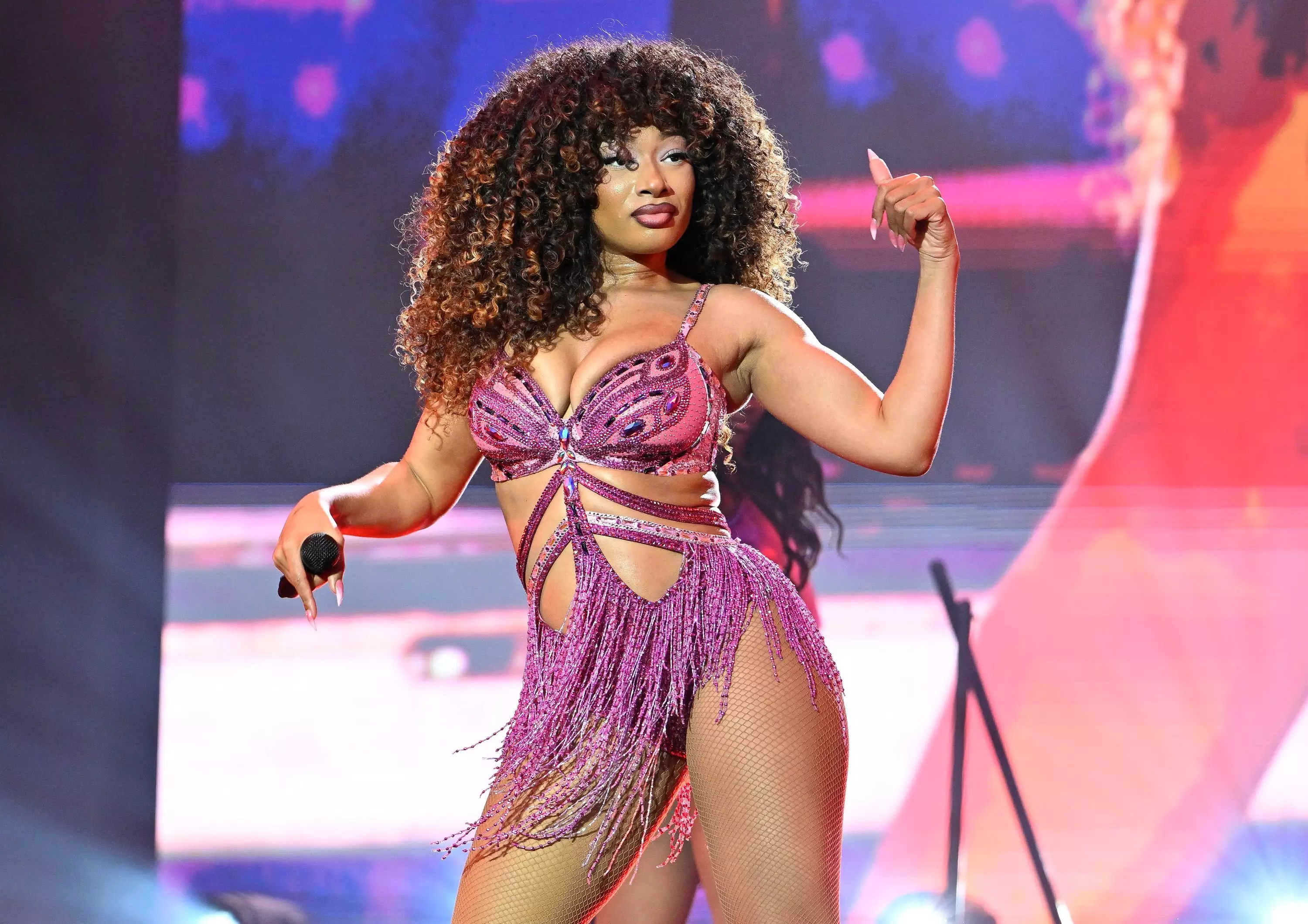
Everything We Know About Megan Thee Stallion's New Album 'Megan': Tracklist, Release Date & More
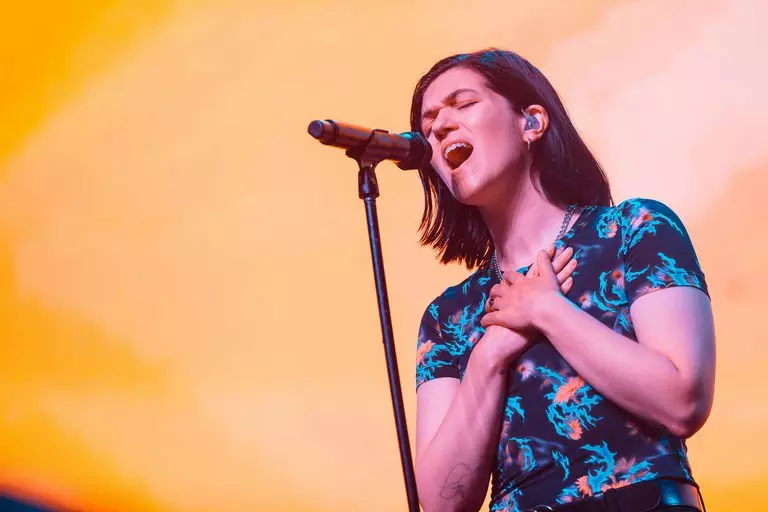
15 LGBTQIA+ Artists Performing At 2024 Summer Festivals
Inspiration Comes From Everywhere
The star and her collaborators incorporate unexpected musical influences on Megan via creative sampling. Megan Thee Stallion speeds up and flips Teena Marie's 1984 ballad "Out on a Limb" for "B.A.S." — a song she co-produced with her longtime ally LilJuMadeDaBeat. "BOA" is cleverly crafted from sounds in the first solo hit by Gwen Stefani, 2004’s "What You Waiting For?"
UGK are reunited from across the heavenly divide on the Juicy J-produced "Paper Together," with Bun B contributing new work and the late Pimp C joining in lyrical spirit. This is especially significant when considering that Juicy J produced "Intl’ Players Anthem (I Choose You)," UGK’s 2007 hit with Outkast. Juicy J also made the beats for Megan’s famous song "Hot Girl Summer."
That’s just the tip of the iceberg when it comes to samples waiting to be discovered on Megan. There are many more riffs and other musical notions that the sample bank in our brains have yet to detect.
Self-Love Is Queen
Whether she’s affirming, "I’m worthy, not worthless" on "Worthy," or literally touching herself in the auto-erotic "Down Stairs DJ" (which joins masturbation masterpieces like Divinyls’ "I Touch Myself" and Tweet’s "Oops"), Megan is grounded in songs that promote self-love as the best kind of love.
She does admit that this is sometimes a challenge to embody, as when she talks about lingering depression on "Moody Girl." But the album generally moves towards the light.
She Loves Japan
One of the big surprises on Megan is that she raps in two languages. She rhymes beautifully in Japanese on "Mamushi" with Yuki Chiba, a seasoned rapper from Japan who is influenced by the Southern swag. (Just take a look at the Memphis moves and Houston rhyme schemes of his viral song "Team Tomodachi.")
On "Otaku Hot Girl," she raps about the manga series "Naruto" and drops other anime references to show her love of Japanese pop culture.
Learn more: 10 Neo J-Pop Artists Breaking The Mold In 2024: Fujii Kaze, Kenshi Yonezu & Others
Megan's Game Is Tight
Megan is the first album to be released on Megan Thee Stallion’s own label. It follows her split from 1501 Certified Entertainment, a record label with which she was engaged in a protracted and ugly legal battle for earnings.
She now has the muscle of the major label Warner Brothers as a partner for her independent venture, Hot Girl Productions. She also recorded an Amazon Original song called "It’s Prime Day" for a commercial, as well as an exclusive Amazon edition of Megan.
It’s safe to say that this album represents a new level of business freedom and acumen for Megan Thee Stallion.
PRIDE & Black Music Month: Celebrating LGBTQIA+ & Black Voices

Celebrating 30 Years Of Essence Fest: How New Orleans & Multi-Generational, Diasporic Talent Create The "Super Bowl Of Culture"

Celebrating Missy Elliott: How The Icon Changed The Sound, Look & Language Of Hip-Hop

Tekno Talks New Music, Touring America & His "Elden Ring" Obsession

5 LGBTQIA+ Record Labels To Check Out: Get Better Records, So Fierce! And Others

Celebrate 40 Years Of Def Jam With 15 Albums That Show Its Influence & Legacy
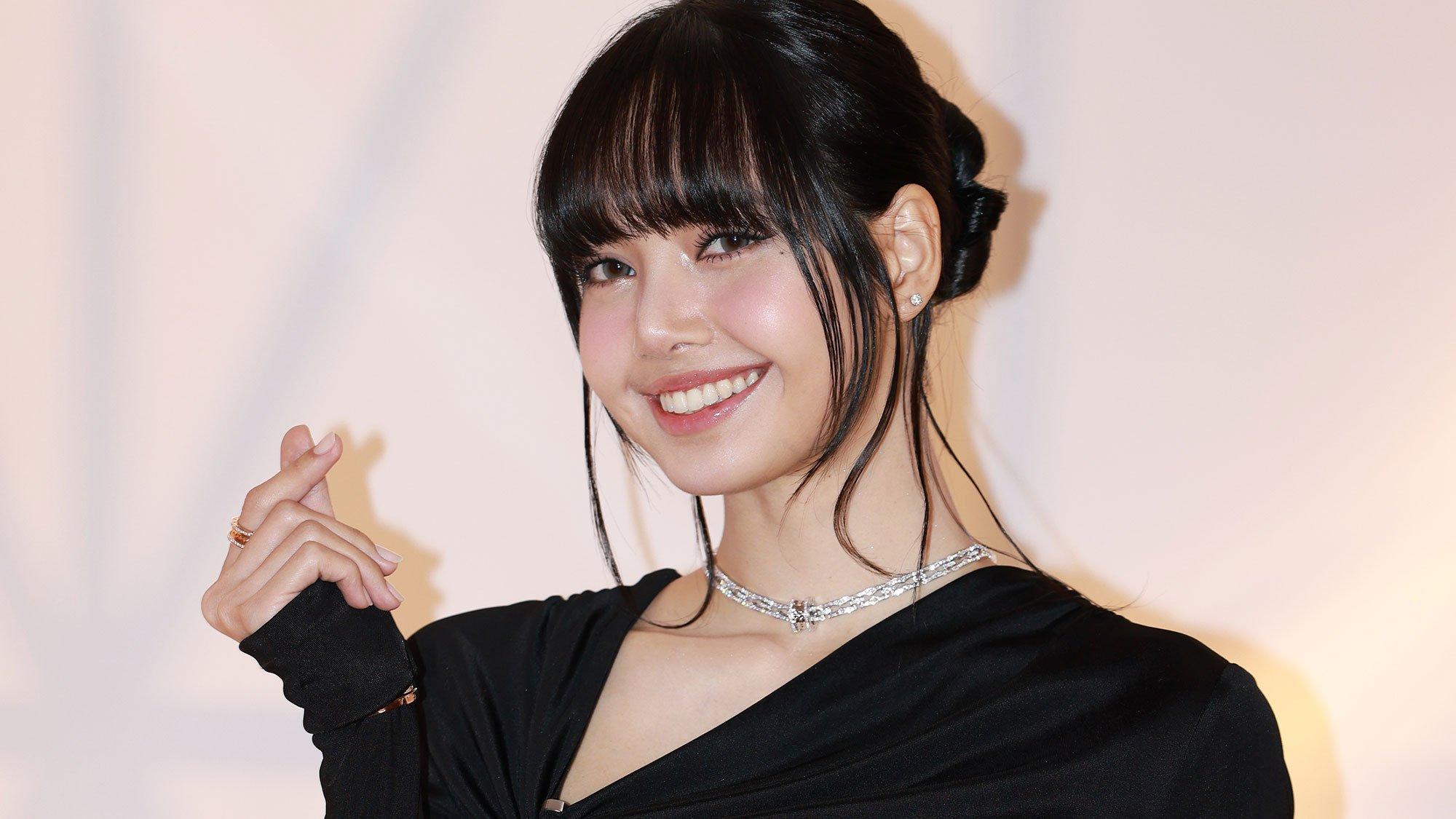
Photo: The Chosunilbo JNS/Imazins via Getty Images
list
New Music Friday: Listen To New Songs From LISA From Blackpink, Lil Nas X, Kelsea Ballerini, MC Lyte & More
Hot summer days require even hotter tunes. Here are some fresh-out-the-oven songs and albums by Hiatus Kaiyote, Lucky Daye, Headie One, Kaitlin Butts, and more.
We’ve been feeling the heat for a minute now, but summer is finally, officially, upon us.
What do you have on deck to soundtrack it? Perhaps you’re checking out Camila Cabello’s fourth offering, C,XOXO. Or Jxdn’s expectations-bucking new album, When the Music Stops. And there are so many other worthy candidates for your playlist — from Lupe Fiasco’s Samurai to Omar Apollo’s God Said No.
No matter where your stylistic compass points, this Friday release day has got something for you. As you gather your sunscreen and shades, let’s breeze through a cross-section of what’s out there.
LISA — "Rockstar"
K-pop loves its solo releases, showcasing how the various members of a group can shine individually while combining with ecstatic chemistry. Enter LISA, one-fourth of Korean titans BLACKPINK, who's already turned heads with her 2021 debut album, Lalisa.
"Rockstar" is another swing outside her main gig, featuring serrated chiptune production and LISA's commanding rap flow. The gritty, urban, futuristic video is a visual treat, and the chorus's boast of "Lisa, can you teach me Japanese?" is a multilingual flex — as well as a maddeningly unshakeable earworm.
Kelsea Ballerini & Noah Kahan — "Cowboys Cry Too"
The "Peter Pan" heavyweight and four-time GRAMMY nominee Kelsea Ballerini has called 2024 "a new chapter of music." Her collaboration with folk/pop singer/songwriter Noah Kahan, "Cowboys Cry Too," is the tip of the spear.
More than a month after the pair performed together at the 2024 Academy of Country Music Awards, their first recorded team-up is an aching, yearning ballad about breaking down a gruff exterior and revealing true emotions.
"Cowboys cry too/ They may not let 'em fall down in their hometown thinkin' they still got s*** to prove," Ballerini sings in the chorus. "That well runs deep/ But when he's showin' his skin, lettin' mе in, that's when he's toughest to mе."
Lil Nas X — "Here We Go!" (from the Netflix film 'Beverly Hills Cop: Axel F')
"So excited to release the best song of all time this friday!," Lil Nas X proclaimed on Instagram. (And on a Beverly Hills Cop soundtrack, no less!)
"Here We Go!" comes at an inflection point for the "J Christ" singer: "sorry I've been so scared with my art lately," he added in the same post. "I'm coming around to myself again. I will make you guys very proud."
This pro forma banger certainly inspires pride: tenacious lines like "I'm livin' and livin' I wanna die/ They tryna get even/ I'm beatin' the odds" will get under your skin. As for Beverly Hill Cop: Axel F, the Eddie Murphy joint will whiz to your screen July 3 via Netflix.
Lucky Daye — 'Algorithm'
Lucky Daye picked up a win for Best Progressive Album at the 2022 GRAMMYs, for Table for Two. After a slew of nominations for work with Beyoncé and Mary J. Blige, he's investigating the Algorithm.
The single "HERicane" was just a teaser, with songs like "Blame," featuring Teddy Swims; "Paralyzed," featuring RAYE;" and "Diamonds in Teal" expanding on and honing his soul-funk-R&B vision.
"Don't know pickin' sides/ 'Cause I'm rollin' in desire," he dreamily sings in the gently roiling "Diamonds in Teal." "I don't know which lie's true/ Or maybe I do, or maybe I'm you." It's a suitable mission statement wrapped in a stealthily seductive package.
Hiatus Kaiyote — 'Love Heart Cheat Code'
A jazzy, soulful, psychedelic band of Aussies, Hiatus Kaiyote has been wowing audiences for more than a decade. Whether through sampling or features, they've crossed paths with Drake, Anderson .Paak, and Beyoncé and Jay-Z.
Love Heart Cheat Code builds brilliantly on their last three albums: their 2012 debut Tawk Tomahawk, 2015's Choose Your Weapon, and 2021's Mood Valiant. Tracks like "Telescope," "Everything's Beautiful," and "Make Friends" are burbling brooks of atmosphere, groove and vibe.
Boulevards — 'Carolina Funk: Barn Burner on Tobacco Road'
Any fans of deep, pungent funk grooves should investigate Boulevards immediately. The project of mastermind Jamil Rashad, their new album Carolina Funk: Barn Burner on Tobacco Road tips its hat to yesterday's funk with a contemporary twist, bringing a refreshing spin on the well-trod template of syncopated basslines and stabbing horns.
Across highlights like "Do It Like a Maniac Part 1&2" and "Run & Move," Boulevards shows — once again — that few can nail this gritty sound quite like Rashad and crew.
Headie One — 'The Last One'
British drill-inflected MC Headie One first made a splash overseas with his 2023 debut album, Strength to Strength. Less than a year later, he's returning with The Last One.
Back in 2022, he hinted at the existence of his sophomore album in his non-album track "50s" — "The fans calling for 'Martin's Sofa'/ It might be the first single from my second," he rapped.
Helmed by that single, The Last One features Potter Payper, Stormzy, Fridayy, Skrillex, and more. The album is a leap forward in terms of production, scale and exploration.
Katlin Butts — 'Roadrunner!'
Any theater kid worth their salt knows at least a few bars from the musical "Oklahoma!"; country sensation Kaitlyn Butts has just unfolded it into an entire album.
"It's a love story but there's also a murder and a little bit of an acid-trippy feel to it at times; it's set in the same place where I come from," she said in a statement, noting she saw "Oklahoma!" with her parents every summer during childhood. "Once I got the idea for this album," she continued, "I couldn't believe I hadn't thought of it before, and it turned into something that completely encompasses who I am and what I love."
A laugh riot as well as a colorful, openhearted statement, Roadrunner! does the old Rodgers and Hammerstein chestnut good.
Read more: 5 Female Artists Creating The Future Of Country Music: Jaime Wyatt, Miko Marks & More
Amaarae — 'roses are red, tears are blue — Fountain Baby Extended Play'
Futurist Afropopper Amaarae made a gigantic splash with her second album, 2023's Fountain Baby — even Pitchfork gave it their coveted Best New Music designation.
That lush, enveloping album just got an expansion pack: roses are red, tears are blue — A Fountain Baby Extended Play is a continuation of its predecessor with six new songs. The oceanic "wanted," featuring Naomi Sharon, is a highlight, as is a remix of "Disguise" with 6LACK.
"Ooh, I'll be wanted/ I've been wanted," a pitch-shifted Sharon sings near the end, as if turning over the phrase. "Wanted" is one way to describe Amaraae's position in the music landscape.
Learn more: Meet The Latest Wave Of Rising Afrobeats Stars: AMAARAE, BNXN, Oladapo & More
MC Lyte — "King King" (feat. Queen Latifah)
The 50th anniversary of hip-hop may have come and gone, but hip-hop is forever. Today, legendary hip-hop pioneers MC Lyte and Queen Latifah continue to bear the flame of the genre as an elevating force with "King King," a conscious, uplifting offering.
"This is dedicated to all the kings and all the soon to be kings/ We're counting on you/ We love you/ This is for you, you and you and you," MC Lyte begins, while Latifah holds it down on the chorus with "This your crown hold it/ Even if it all falls down show it/ You know the world is watching now I know you get tired from keepin' it all together/ We need you."
During Women's History Month in March, MC Lyte released "Woman," the first single from her upcoming album, featuring hip-hop icons Salt (of Salt 'N Pepa), Big Daddy Kane, and R&B singer Raheem DeVaughn. MC Lyte's first new album in nearly a decade drops this summer; keep your eyes and ears peeled.
Learn more: 9 Teen Girls Who Built Hip-Hop: Roxanne Shante, J.J. Fadd, Angie Martinez & More
Latest News & Exclusive Videos

Behind Ryan Tedder's Hits: Stories From The Studio With OneRepublic, Beyoncé, Taylor Swift & More

Crowder Performs "Grave Robber"

NCT 127 Essential Songs: 15 Tracks You Need To Know From The K-Pop Juggernauts

5 Rising L.A. Rappers To Know: Jayson Cash, 310babii & More

Why Elliott Smith's 'Roman Candle' Is A Watershed For Lo-Fi Indie Folk
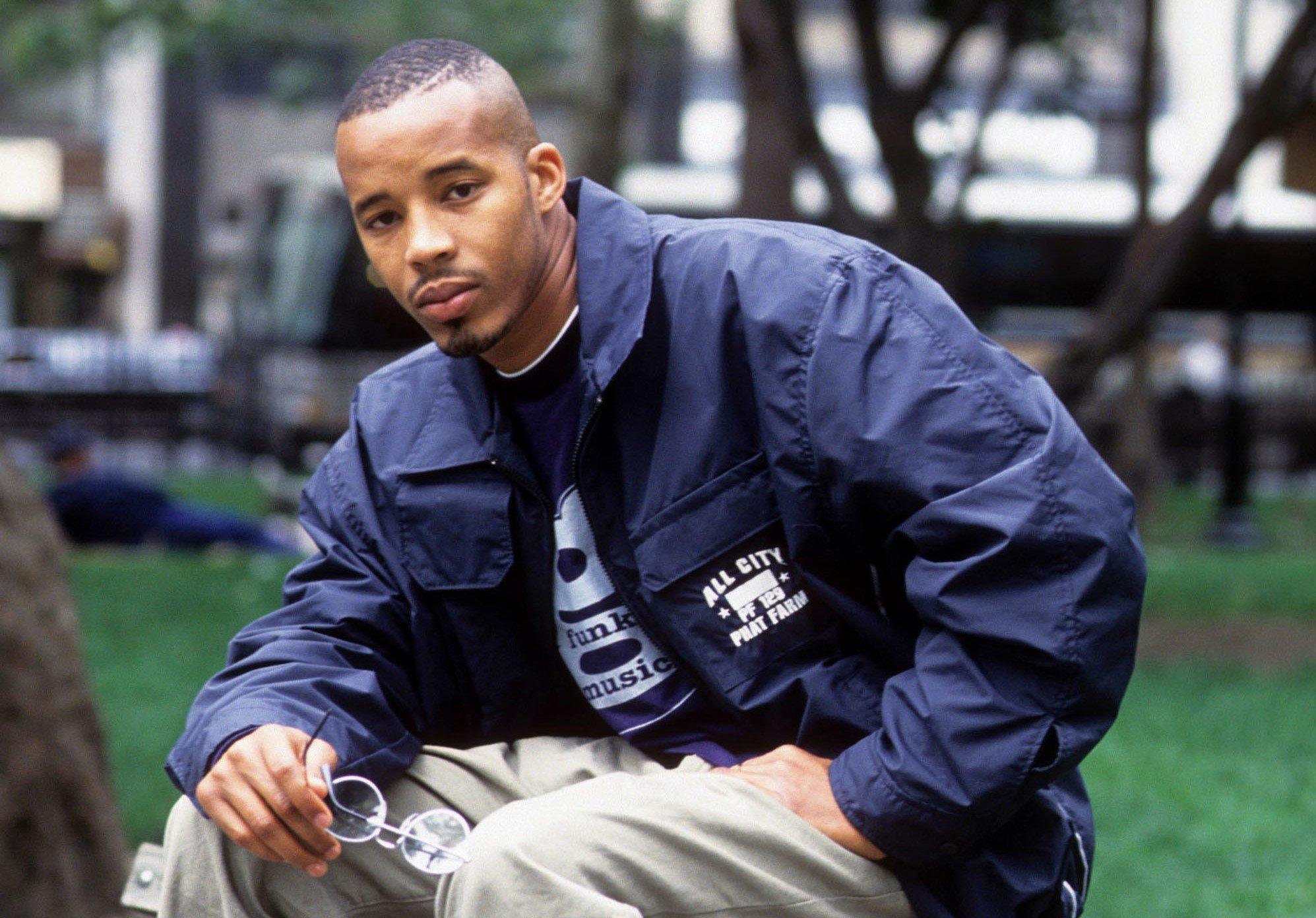
Photo: Al Pereira
list
Warren G Revisits 'Regulate: The G-Funk Era': How The 1994 Album Paved The Way For West Coast Hip-Hop's Dominance
Long Beach's Warren G has consistently carried the flag of g-funk, from 1994 to present. The GRAMMY nominee revisits his classic album, which offered a different perspective on Southern California life.
In the canon of West Coast hip-hop, Warren G’s debut album, Regulate: The G-Funk Era is considered one of the greatest.
Released on June 7, 1994, the album remains a perfect snapshot of the g-funk era, the popular subgenre of gangsta rap that was all the rage in the early- to mid '90s. "I created the genre, but I was introduced to it by Above the Law," Warren G tells GRAMMY.com.
Headlining that album is of course, Warren G and Nate Dogg’s iconic track "Regulate," tapping that four-bar sample from Doobie Brother Michael McDonald’s "I Keep on Forgettin’." But the album features a number of other hits including "This D.J." and "So Many Ways," a remix version later appearing on the Bad Boys soundtrack.
"Regulate" the single first arrived on the star-studded soundtrack for Above the Rim, released via Death Row Records in the spring of 1994, and sold over 2 million domestic copies in the year of its release. Then a few months later, Warren reintroduced "Regulate" on his inaugural album. The 12-track Regulate: The G-Funk Era provided a full vision of The Regulator's uber smooth brand of g-funk which rang out from the 213 all around the world.
Thanks to pioneers like Above the Law, Dr. Dre, DJ Quik, and Warren G, g-funk (or gangsta funk) became the definitive sound of West Coast hip-hop. Regulate: The G-Funk Era was so impactful that it was even nominated for Best Rap Performance By A Duo Or Group at the 1995 GRAMMYs.
Like Dre's The Chronic, many continue to be drawn to Regulate’s depiction of Southern California life, replete with endless sunshine and maxed-out cars blasting pioneer speakers. Regulate is also the story of Warren G, a personal album which gives love to the community and people he came up with ("I played ball through the halls of CIS / With Snoop Dogg's big brother, call him Dirty Left," he raps on "This D.J.", referencing College Intermediate School in Long Beach ).
With Regulate, self-described "outlaw" Warren G made a platform for himself and some of his disciples. Album features the Twinz, an LBC duo consisting of twin brothers Deon and Dewayne Williams, and the Dove Shack, whose summer anthem "This is the Shack" (later reprised on the group’s own album with the same title a year later), took the West Coast hip-hop world by storm. Though the great crooner Nate Dogg died more than a decade ago, 213, the Long Beach collective of Warren G, Snoop Dogg and Nate Dogg lives on. Warren and Snoop just released the single "Cali 2 Canada," in advance of an upcoming tour.
Regulate was Warren G's first release after effectively being exiled from Death Row Records, where his halfbrother and mentor Dr. Dre, not to mention Long Beach pals Snoop Dogg and Nate Dogg thrived. Warren signed with Def Jam Records in 1994, and his debut release helped save the label from serious debt: Regulate: The G-Funk Era sold 3 million copies in the U.S. and debuted at No. 2 on the U.S. Billboard Top 200 albums chart.
As we look back on 30 years since Regulate the G-Funk Era, GRAMMY.com connected with Warren G himself to look back on five ways the album paved the way for west coast hip-hop today.
It Solidified Long Beach As A Hip-Hop Mecca
Warren G isn’t the first Long Beach rapper who made waves during this era. There’s Snoop, of course, as well as Missouri-born, Long-Beach raised Domino. But Regulate: The G-Funk Era feels like a whole album about place, giving love to the LBC on every track with people and places like 21 and Lewis, King’s Park, the Voltron Crew, and Cal State Long Beach as Warren shouts them out on tracks like "Regulate" and "This D.J."
Warren acknowledges that there were the realities of the streets, but also plenty of fun to be had growing up, too, including listening to old records for hours together with his father. "Coming up in Long Beach was fun. We had a lot of sports. Lot of neighborhood activities as far as King’s Park," Warren G tells GRAMMY.com. "It was fun. It was dangerous. It was cool. It was my home."
Voltron Crew is Warren’s group of friends he used to sell candy with while having rap battles. Warren impressed the crew by rapping the lyrics to some of Dre's yet-to-be-released material, including "Cabbage Patch." "'Damn Warren, you’re harder than a motherf—a,'" he recalled his friends saying with a laugh.
And then there’s Warren’s beloved VIP Records on Pacific Coast Highway which Warren calls an LBC "landmark." He and his friends would walk down there after school to listen to music as one DJ after another queued up inside of the institution to spin. "It was just fun for us to be able to see that and listen to good music at the same time," Warren adds.
It Made Nate Dogg A Star
The late great Nate Dogg was already on the rise on the West Coast with early vocals on Dre’s "Deeez Nuuuts," Mista Grimm ft. Warren G’s "Indo Smoke," and Snoop’s "Ain’t No Fun." But the titular track "Regulate" made him soar. While Nate is given a featured credit, he’s lockstep with Warren during the entire song, matching Warren’s lyricism with his own hybrid style of singing and rapping that had never been seen in hip-hop before and hasn’t been seen since.
Back in those days, hip-hop often didn’t really promote its hookmen and women — much less feature them prominently in their music videos. (Consider Nate’s Bay Area contemporary Mike Marshall, who sings the hook on Luniz’s classic "I Got 5 On It," but unfortunately isn’t remembered beyond West Coast hip-hop diehards.) But Nate made himself seen and heard on "Regulate."
It’s no coincidence he went on to become the go-to hook singer in California and beyond, working with everyone from Tupac and Ludacris, to French hip-hop group Psy 4 de la Rime. Nate Dogg passed away in 2011 at age 41.
It Presented A Different Version Of West Coast Gangsta Rap
When compared to some of his contemporaries, Regulate: The G-Funk Era focused less on hardcore themes in favor of keeping things light and smooth. Even "Regulate" itself — which is about Nate and Warren dealing with a carjacking on a cool and clear California night — the Mississippi-born crooner who grew up in a Gospel choir always had a way of keeping things mellow.
Regulate: The G-Funk Era also speaks to the turbulent climate of ‘90s inner-city Los Angeles. While Dre’s The Chronic might be more overt about it, Warren goes there too on songs like on the album’s third single, "Do You See," whose beat mashes up Mtume’s "Juicy Fruit" and Junior’s "Mama Used to Say." Much of that song, Warren G says, is personal.
"I just talked about everything I was going through, ya know, Snoop being in jail," he recounts. "Mista Grimm is my dog. But he was doing things that just wasn’t cool…But I forgave him for all of that still. Even though I talked about it in the song. I forgave him 'cause that was my dog. He’s still my dog."
"Do You See" speaks about realities beyond the LBC, too. It opens with a sample from Gil Scott-Heron’s 1976 fiery spoken word piece "Bicentennial Blues": "The blues has always been totally American… as American as apple pie… the question is why?...Well, America provided the atmosphere."
"I had listened to that particular [song] and everything he said was what I was going through. It blew me away," Warren says.
It Introduced Us The Dove Shack, Twinz & Jah Skillz
After not being able to get footing in Death Row, Warren G struck out on his own. He built his own roster of lesser-known talent on G-Funk Music, under the parent label Def Jam Recordings, and brought in Dove Shack (C-Knight, Bo-Roc and 2Scoops), the Twinz, and Jah Skillz, part of the larger female group Da 5 Footaz —who all got the G-Child cosign. Each artist debuted on Regulate: The g-funk Era, with summertime anthem "This is The Shack," an album standout.
Many of Warren G's guest features went on to have their own careers. Dove Shack member C-Knight recently passed away and Bo-Roc, a crooner in his own right, went on to work with other West Coast legends like Richie Rich, Daz Dillinger, and Foesum. Twinz, meanwhile, turned bass-heavy feature "Recognize" into the full-fledged Conversation in 1995, a g-funk album that gave us one of Warren G’s greatest beats, "Journey Wit Me," featuring Bo-Roc.
As for Jah Skillz, she’s front and center for the entirety of "Super Soul Sis," and wastes not a single word. Da 5 Footaz went on to appear on the Jason’s Lyric and Set It Off soundtracks.
It Gave G-funk Its Timeless Credo
A few people are credited for launching g-funk, but Warren G’s timeless credo: "g-funk, where rhythm is life and life is rhythm," in the waning moments of "Regulate" and "And Ya Don’t Stop" remains a classic to this day.
On his 1997 sophomore album Take a Look Over Your Shoulder and 1999's I Want It All, Warren G always shouted out gangsta funk. He also stayed true to the sound that spread west coast hip-hop worldwide: By 2001, a couple of years after the g-funk era fully ended, Warren defiantly proclaimed that "g-funk is Here to Stay" on Return of the Regulator.
In 2015, he even put out an EP, Regulate... G-Funk Era, Part II, featuring unreleased music with his longtime partner Nate. From 1994 through 2024, Warren has consistently carried the flag of g-funk, the original west coast sound that he helped cement with Regulate The g-funk Era, 30 years ago.
A Guide To Southern California Hip-Hop: Definitive Releases, Artists & Subgenres From L.A. & Beyond
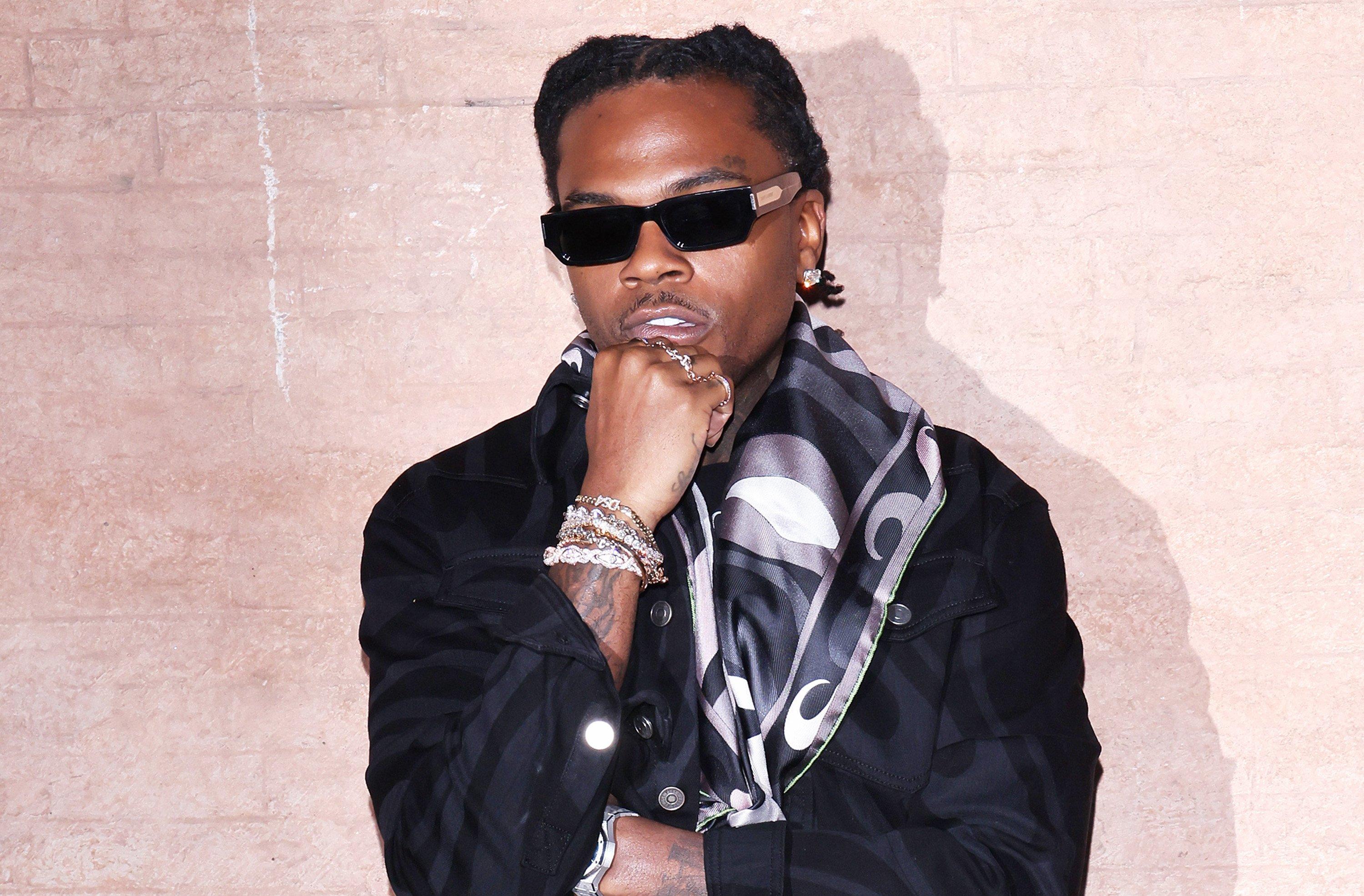
Photo: Ernesto Ruscio/WireImage
list
Gunna Is Defiantly 'One Of Wun': 5 Takeaways From The New Album
Amid legal drama and rap feuds, Gunna dropped his fifth studio album — and showed that none of the negativity is going to drag him down.
A new album from Gunna is bound to be notable and controversial. Many in the rap world had strong feelings about how the racketeering case against many members and affiliates of his label YSL Records — including, most notably, him and Young Thug — worked out for the Atlanta star. After Gunna took a plea deal in December 2022, the word "snitch" was thrown around not infrequently; he was rumored to have tensions with rappers including his close collaborator Lil Baby and, unsurprisingly, Young Thug.
Gunna's 2023 album, a Gift & a Curse, released about six months after his plea, seemed to be his attempt to move past all of that. In some ways, it worked. The album was a success, containing his highest-charting solo hit to date with "fukumean."
But still, the negative image followed him around. Despite his chart success — along with a few notable Afrobeats songs that brought attention from a whole new market — Gunna's controversial past was brought to light yet again when he was referenced in Kendrick Lamar's recent Drake diss track, "Euphoria," in a less-than-flattering way.
Now, Gunna has made his latest big statement with his fifth album, One of Wun, where he addresses both his feelings about the public response to his plea, and what his life has been like since it occurred. The new LP finds Gunna unbowed, positive and defiant. It's a fascinating project, with themes that anyone with even a cursory knowledge of the rapper's career to date will find timely and relevant.
As you dig into One of Wun, take a look at five major takeaways from Gunna's new album.
Gunna Remembers What His Haters Said
One of Wun features many references to people who hated on or didn't believe in Gunna. Rarely is this explicitly tied to blowback from the YSL case, but it doesn't need to be: "I swear I don't want no apology," he says on "whatsapp (wassam)." But it's not that he doesn't feel he deserves one.
Throughout the album, Gunna makes it very clear that he is aware of all the criticism. "Heard all about how they want me to lose, but I'm W, here for a win," he spits on the title track; the first verse of "on one tonight" echoes that sentiment, "They hope I fall off, ain't no way." Gunna knows, as he says on the nautically themed "neck on a yacht," that his haters want him to sink like the Titanic, but he'll never give them the satisfaction.
The most explicit reference to the YSL situation is on "prada dem," where he disposes of any controversy with a simple pun: "I'm not a rat — still getting cheddar."
He Loves Women A Lot, But Not Deeply
It's not all just clapbacks on One of Wun; there is a lot of rapping about women and sex, too. The aforementioned "neck on a yacht," for example, is about exactly what the title might lead you to think it to be. So is "treesh," named after New York slang for a person with lots of partners. Even "clear my rain," musically one of the most adventurous tracks on the project with its Afrobeats-esque feel, is lyrically in this vein as well.
However, it's clear this album wasn't inspired by romance. Gunna never gets personal, and "Body right, she a ten in the face/ F— her all night and all through the day" is about as specific as he ever gets. This is not out of line in Gunna's catalog, and this consistency provides proof that his lyrics about standing his ground are accurate both inside the recording booth as well as the world outside.
Emotion And Vulnerability Ultimately Make The Album Memorable
Gunna may not be in his feelings about women, but he certainly is in other ways. The times where he moves past his triumphing-over-the-haters stance and lets his guard down are the most effective moments of the whole album.
Exceptional in this regard is the track "conscience," in which he admits that the people who betray him are making him "feel low." "I'm fed up with this nonsense," he says. "Lotta s—, and it's weighing on my conscience."
That bit of vulnerability adds a tremendous amount of context to his talk of his determination — and the spiritual and material victories that come because of it — throughout the rest of the record. The very album title tells you of Gunna's uniqueness, and the record's glimpse at his vulnerabilities make the case for that even more than his boasts.
There are musically exceptional moments as well — a kind of aural equivalent to his lyrical openness. Much of the album is mid-tempo and trap-inflected, but it ends with an ambitious six-and-a-half minute, two-part epic called "time reveals, be careful what you wish for." It would be wonderful to see more songs with this scope in the future.
He's Back To Collaborating
a Gift & a Curse had no guest appearances at all, marking the first time Gunna had ever gone completely solo on any of his five albums. Whatever the reason for Gunna's decision for no features on his previous project — whether it was an artistic choice, the swirling talk around his guilty plea, or something else — he's back to collaborating on One of Wun. The rap star recruits Normani ("$$$") and Leon Bridges ("clear my rain"), as well as two fellow rappers, Offset ("prada dem") and Roddy Ricch ('let it breathe").
That said, Gunna has never been one for a ton of guest features, particularly in comparison to most big-name rap releases. And with regular standbys Lil Baby and Young Thug off the table (the latter was in jail), the return of Gunna's "Cooler Than a Bitch" collaborator Roddy Ricch seems to indicate that at least some of his rap pals are willing to work with him again.
He's Placing Emphasis On Being A Musical Rapper
With 20 songs on the track list, One of Wun gives Gunna plenty of time to experiment — to try different vocal approaches, melodies and rhythms. While there is plenty of rap's tried-and-true triplet rhythm across the album, he goes far beyond it as well.
He adjusts his rapping approach not only to fit the music of the song, but also the subject matter. He's straightforward, repetitive and aggressive when the subject matter calls for it, like on the defiant "whatsapp (wassam)"; elsewhere, he tries different musical ideas on songs like the more introspective "conscience." This makes the album feel like a true body of work, one where his defiance comes to life not only in his words, but in sound as well.
Gunna released One of Wun into a climate with a lot of questions. The record succeeds in not only talking about his recent worries and conflicts, but dramatizing them in lyrics and music. He's using the raw material of his life — and the media narratives around it — to sculpt a coherent narrative, where every aspect of the album has a part to play in telling his story. He delves deep into his defiance, and his worries, and converts them into a real artistic statement.
"Independence weighing on my conscience hard," he raps on "conscience." Gunna makes sure not only that he says that theme in words, but expresses it in every aspect of this record. That vision and ability makes him truly one of one.
